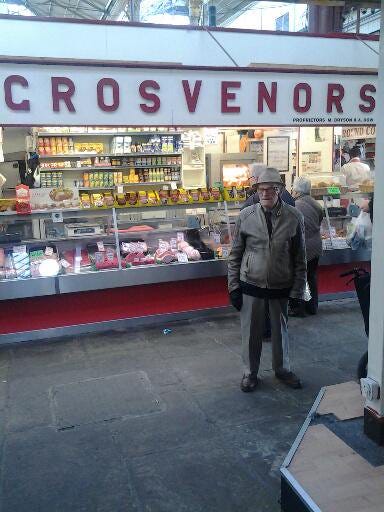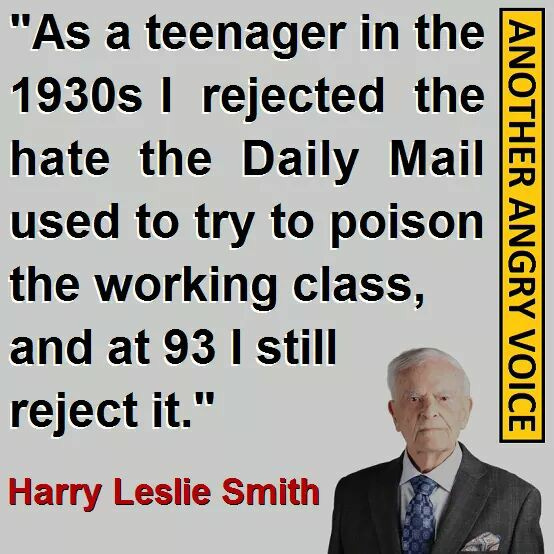"Capitalism in the 1930s sentenced me to a lifetime of drudgery."
Before my father died in 2018, he wanted to demonstrate by using the history of his life and working-class contemporaries born in the early 20th century -that without a return to socialist politics fascism and wealth inequality would destroy not just our society but civilisation itself.
He wasn’t wrong. So much potential, so much happiness, so much living has been lost through capitalism's insistence that poverty is necessary for wealth creation. We became the broken eggs for the 1% omelette of excess. People are living the nightmare of lost hope in the 21st century because of neoliberalism's response to COVID-19, the cost of living crisis, the refugee, and the climate crisis. It’s a 1930s reality that ends in war but this time, unlike during WW2, it may conclude with fascism as the winner.
His unfinished history- The Green & Pleasant Land is a part of that Las Stand project.
For the last year, I have been refining and editing The Green And Pleasant Land to meet my dad’s wishes. Below are more chapter excerpts from it.
Chapter Twenty-Four
At the end of the spring term in 1937, I was destined for full-time manual work. It was what was done to fourteen-year-olds, who came from the working class and weren't part of the small minority permitted a grammar school education.
Capitalism in the 1930s goal was to exploit me for the wealth creation of others until I was dead. My future was supposed to be like my past- a life sentence of drudgery.
A month or two before school ended, my family upped sticks from King Cross because of rent arrears and moved to Boothtown Road. It was a cramped and noisy house where my sister Alberta, my two brothers, my mother and her boyfriend Bill never had a moment alone.
We grated up to each other with impatience and short tempers. The long years of economic turmoil had rubbed away common courtesy. There was a stroppiness to our interactions. Mine were made worse because my emotions were unkempt from puberty.
But there was something else about my ill temper that no one in our house grasped. I understood my life was being ground down by a system that benefitted the few at the expense of the many and that enraged me.
My choices of work were already predetermined by my class and the limited education provided by the state.
At fourteen, I could read, write, and do sums. Most importantly, my teachers had attempted to indoctrinate me to believe that Britain had an eternal imperial destiny. Lessons about our Empire didn't stick because I despised the monarchy. I hated the whole rotten system that held it together.
When George the VI was crowned following his brother Edward's Abdication in the Spring of 1937, every school child in Britain was presented with a small tin of chocolate. I remember looking at it and thinking, that this token was a gift with strings attached. It was intended to make me, and other young people in Britain believe our monarchy was benevolent towards us rather than a malignant conglomeration of oppression.
My sister Alberta didn't understand my rebelliousness against the system. To her what we endured was an "ever thus" lot for working-class teens. She was seventeen and accepted that her job in a mill was the best she could hope for in life. The Labour Party of the 1930s that promised to change the dead-end prospects for our kind didn't interest her. To Alberta, left wing politics was the same as religion. "It's bloody pie in the sky."
I believed it was evil when society underpaid workers like me to benefit the owners of industry.
Alberta thought it was arrogance for me to believe I deserved a better education.
Despite a deep heart and strong belief in fighting for the underdog, Alberta didn't put much stock in books, ideas or anything much deeper than a breezy romance playing at the cinema. Alberta was resigned to what Tories and the middle class expected us to shoulder for their betterment.
My sister wanted to find love and happiness within a society that favoured the rich exclusively. I hungered for change and a different political order.
By the time, I entered my teens, Alberta had begun to drift apart because we experienced the same physical deprivations of the Great Depression but processed their causes differently.
We were in separate struggles to locate a life worth living after sharing the wrath of the early 1930s.
My sister saw me as an odd duck but still loved me with the marrow of her being. She was insistent about making a big deal over my school leaving as if it was a rite of passage rather than a one-way fair to a dead-end job in a dead-end, mill town.
Alberta took me on a day trip to Blackpool to mark my transition from boy to man in working-class Yorkshire.
There was something magical and mythical about Blackpool to the working class of my generation.
It was a city filled with diversion and amusement where, throughout long summer nights, the town was set ablaze with its illuminations. It was a destination where romance was found while riding the Ferris Wheel and sharing a piece of Blackpool rock.
It was an adventure to go there because- outside of my parents taking our family on a day trip to Southport in 1928. I'd never been on a holiday excursion.
We went on a Sunday by train and sat in a third-class carriage where we smoked cigarettes. I pretended we were on a train to Dover, where a ferry could take me to France to escape my brute labour future waiting for me.
When we arrived at Blackpool, Alberta, and I found a cheap fish and chip shop and shared a meal of battered cod and chips. In the distance, from where we sat, there was a giant Ferris wheel. And I heard coming from it the clamour of people enjoying their moment at Blackpool.
Looking out towards the water, I observed tiny breakers riding up against the shore while seagulls shrieked in the sky above.
We strolled towards Blackpool Tower, built in the 1890s as an homage to the Eiffel Tower in Paris. At its base- was a giant building that housed a circus, zoo, and aquarium. We gained admittance for a couple of pence and immediately found the animal enclosure, where we laughed at the monkeys. The lions in their cage looked proud and indifferent to our requests to prove they were the Kings of the Jungle by roaring.
In a quiet moment, Alberta said.
“Not a bad life eh, Harry? For the lion that is… all he has got to do is look fierce and tough. Scare the shite out of people. But at tea time, he knows a man will come along and throw- a nice bit of meat his way. Like roast beef or a leg of lamb, we wouldn’t even see on Sunday. For that big pole cat’s supper- I’d roar, snarl and bark.”
Soon after, my sister and I went to the top of the tower and stared out at the water in the distance. It made me yearn to escape England.
Alberta sensed my thoughts.
“One day, Harry, and never you mind, one day- you will get out.”
"We," I corrected her.
"Aye.”
Alberta said in a non-committal tone. My sister knew what tomorrow, and the tomorrow after that, was about to hand out to her.
"It's time to go down. Not much to see up here that I like."
After we descended the tower, we ended up at the dodgems- where my sister and I chased each other around the ring. For the briefest moments, I felt how I imagined teenagers from the middle class lived- without a care in the world.
Alberta and I didn't talk much on the train ride home to Halifax. We were tired from the day, and our hours of carefree leisure were almost up. Silently, we stared out from the train window and watched darkness rapidly descend across our world and Yorkshire.
I started my search for full-time work in earnest the day after my trip to Blackpool with Alberta. To better ensure my chance of landing a full-time job, my sister lent me enough money to get kitted out at a used clothing store called Copley's located off Halifax's High Street.
At first, in misguided optimism, I applied for low-level clerical work in offices and banks. But I was laughed off their premises because I wasn't even a grammar school boy. Potential employers only thought me good enough for rough, underpaid labour like I had been doing, as the saying goes since I was in short pants.
There was no hope of becoming a clerk's apprentice in 1930s Britain for someone like me. There was a pecking order, and I was at the bottom of it.
I decided to try my luck finding an employer in Halifax's Arcade because I reasoned I had worked for off-licenses and grocers as a boy so I was suited for it in adulthood.
It wasn't work that appealed to me. But I was a member of the unskilled working class deemed less essential than a pack animal.
I went to the Arcade and noticed Grosvenor's Grocers had a Help Wanted sign on a post beside their booth. So, I went to the counter and talked to the owner about wanting to work for him.
He hired me as a barrow boy to transport meat and cheese from his main shop to the arcade stall throughout the day. When not pushing a cart, I kept the shop clean.
Mr Grosvenor was a religious fanatic. He stressed that all his employees must have a similar commitment to the teachings of Jesus as he and his wife had. Reverence to Jesus was proved through working as hard as one could for the financial betterment of Grosvenor's grocers.
I pretended to agree and politely nodded my head because I was grateful for the work and the chance to show someone I was able, intelligent and determined to do what it took to make a living for myself.
Shortly after I began working at Grosvenor's, Alberta told me she was moving out of the house. Alberta had found better employment at a textile mill, in Low Moor, near Bradford. My sister said she wanted to be rid of her life with us. She couldn't stomach another minute living with our mother and Bill.
I was sworn to silence until Alberta found a room to let in Low Moor. She wanted to slip from our house on Boothtown Road as easily as a boat leaves its moorings for calm seas outside the harbour. It didn't turn out that way because both the arriving and leaving in my family was a tempest of anger, regret and guilt.
Your subscriptions are so important to my personal survival because like so many others who struggle to keep afloat, my survival is a precarious daily undertaking. The fight to keep going was made worse- thanks to getting cancer along with lung disease and other co-morbidities which makes life more difficult to combat in these cost-of-living crisis times. So you can join with a paid subscription, which is just 3.50 a month or a yearly subscription or a gift subscription. Tip are also welcome. I promise the content is good, relevant and thoughtful. But if you can’t it's all good too because I appreciate we are in the same boat. Take Care, John



So much human potential wasted under this stupid and evil system. Worst of all for me is how many people go along with it, just as long as they don't find themselves at the bottom of the heap.